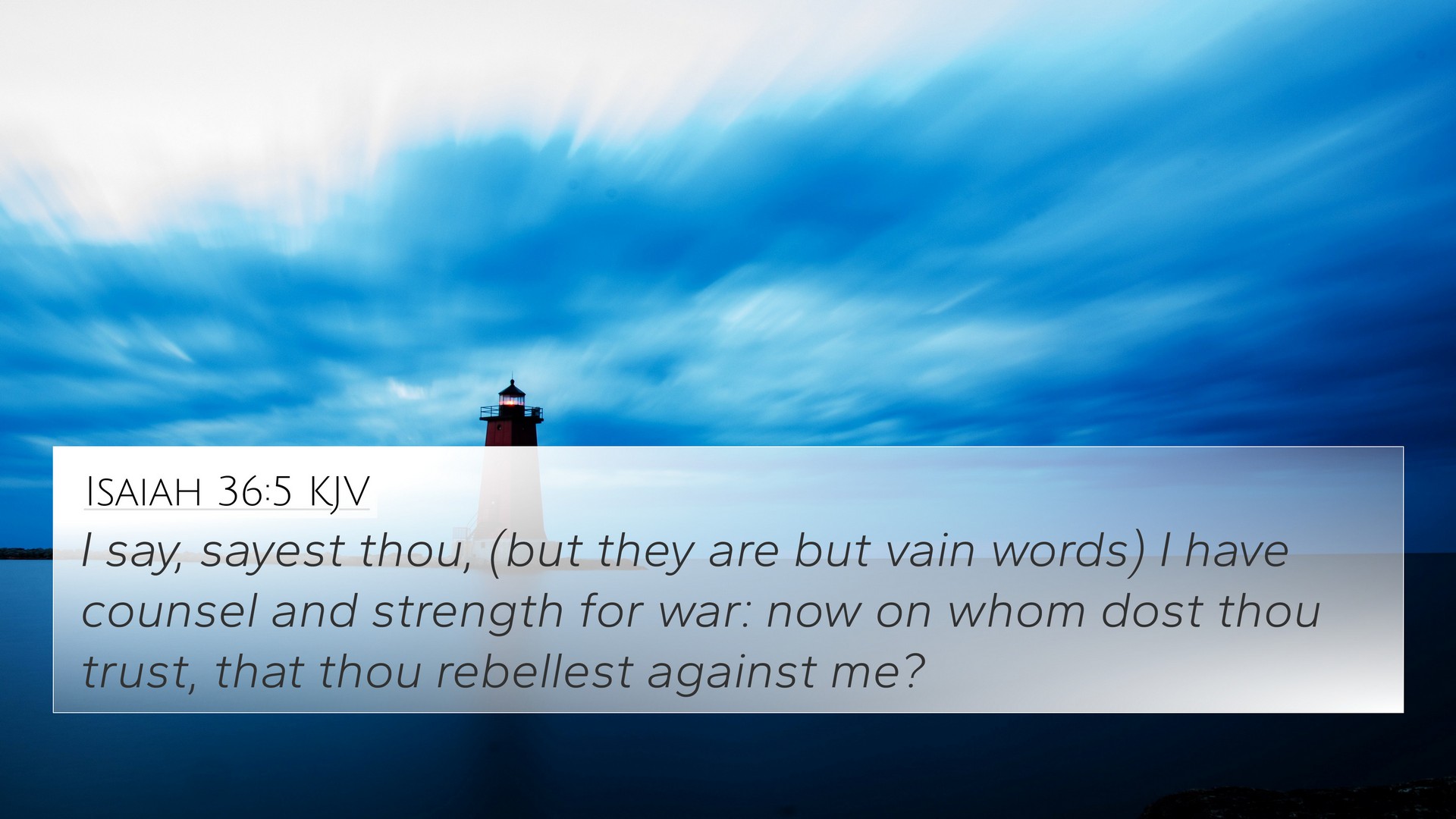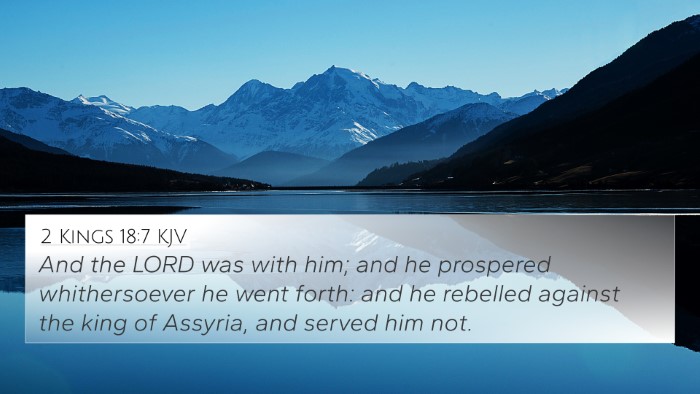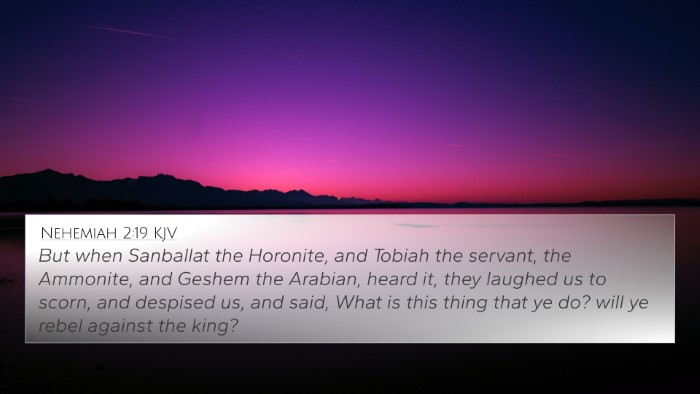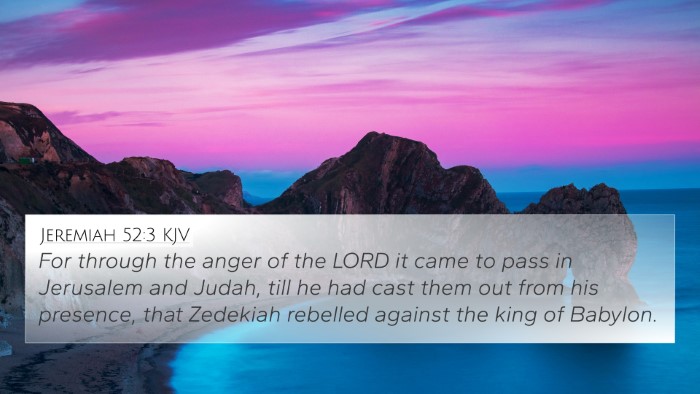Understanding Isaiah 36:5
Isaiah 36:5 presents a crucial moment in the historical narrative of the Israelites, focusing on the interactions between the Assyrian envoy and the people of Judah during the siege of Jerusalem. This verse invites us to explore the themes of trust in God, the challenges faced by His people, and the implications of human diplomacy.
Verse Context
In this verse, we observe the Assyrian official, Rabshakeh, addressing the people of Judah with words intended to instill fear and sway their allegiance. His rhetoric raises questions about faith, reliance on leaders, and the ultimate sovereignty of God amidst earthly powers.
Commentary Insights
The following insights are derived from notable public domain commentaries which help us deepen our understanding of this verse:
- Matthew Henry: Henry emphasizes the blasphemous confidence of Rabshakeh in his words, suggesting that he represents worldly authority that challenges God's promises. He explains that the true power lies with God, and no earthly king or army can stand against Him.
- Albert Barnes: Barnes views this verse as a critical moment showcasing the taunts of the enemy. He points out Rabshakeh's attempt to undermine the people's faith in God by questioning their reliance on Him, thereby serving as a reminder of the struggle between faith and fear.
- Adam Clarke: Clarke offers a linguistic analysis of the verse, highlighting the importance of the words used by the Assyrians. He suggests that the way it is phrased is meant to sow distrust among the people, reflecting the psychological warfare common in ancient conflicts.
Thematic Connections
The main themes surrounding Isaiah 36:5 include:
- Faith vs. Fear: The verse encapsulates the tension between trusting God and succumbing to the intimidation of powerful foes.
- The Challenge of Belief: It illustrates the challenges faced by those who believe in God's protection in the midst of overwhelming threats.
- God's Sovereignty: Ultimately, the events serve to remind the readers of God's absolute authority over nations and their rulers.
Bible Cross-References
Isaiah 36:5 can be linked to several other verses in the Bible that enhance its meaning and context. Here are some relevant cross-references:
- Isaiah 37:10-11: This passage shows the continued verbal attacks against Judah, echoing the theme of trust in God amidst threats.
- 2 Kings 18:19-20: These verses reflect the same context of intimidation from the Assyrians and Judah's response.
- Psalm 37:1-3: A reminder not to fret over evildoers, paralleled with the situation in Isaiah.
- Jeremiah 17:5-7: This contrast of trusting in man versus trusting in God offers a deeper meaning to the choices facing Judah.
- Romans 8:31: "If God is for us, who can be against us?" directly relates to the divine assurance amidst human opposition.
- Matthew 10:28: A call to fear God rather than man, reinforcing the message of Isaiah 36:5.
- Hebrews 13:6: "The Lord is my helper; I will not fear; what can man do to me?" captures the essence of trusting in God's protection.
Comparative Bible Verse Analysis
Analyzing Isaiah 36:5 alongside other scripture can reveal profound truths:
- Inter-Biblical Dialogue: The parallels between the Old Testament narratives and New Testament teachings on faith and fear are striking, illuminating God's unchanging nature.
- Thematic Connections: Identifying similar scenarios in the Gospels where Jesus confronts fear and doubt helps expound upon the meanings within Isaiah.
- Lessons for Today: Just as the people of Judah faced fears, modern believers can look to God's Word for comfort and assurance as they navigate their challenges.
Tools for Bible Cross-Referencing
For deeper study, consider utilizing:
- Bible Concordance: A valuable tool for locating terms and ideas within scripture.
- Bible Cross-Reference Guide: Helps in associating similar themes across different texts.
- Comprehensive Bible Cross-Reference Materials: Essential for thorough study, these can guide users through intricate connections in the Bible.
- Bible Chain References: A systematic approach to link verses that relate thematically or contextually.
Conclusion
Isaiah 36:5 serves as a powerful reminder of the spiritual battles that believers face. Through this verse and its connections to others, we learn about the nature of faith, the challenges presented by worldly powers, and the ultimate truth of God’s sovereignty. As we cross-reference and study these themes, we enhance our understanding of God's word and its relevance in our lives today.









